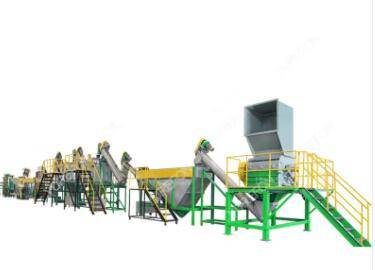What is plastic machinery
2023-10-30
Plastic machinery refers to a broad category of industrial machines and equipment used in the production, processing, and recycling of plastic materials. These machines are a vital part of the plastics industry, serving various functions in transforming raw plastic materials into finished products or components. Plastic machinery encompasses a wide range of equipment and processes, each designed for specific tasks in the plastic manufacturing and recycling sectors.
Common types of plastic machinery and their functions include:
1. Injection Molding Machines: Used to create plastic parts by injecting molten plastic into molds. It's widely employed for producing a variety of plastic products, from toys and automotive components to medical devices.
2. Extrusion Machines: Utilized for shaping plastic materials into continuous profiles, such as plastic pipes, tubing, and sheeting. Extrusion can be used for both thermoplastics and thermosetting plastics.
3. Blow Molding Machines: Designed for manufacturing hollow plastic products, like bottles, containers, and plastic tanks. Blow molding includes various techniques, including extrusion blow molding and injection blow molding.
4. Thermoforming Machines: Employed to shape thermoplastic sheets into specific forms using heat and molds. This process is commonly used for packaging, trays, and consumer products.
5. Plastic Recycling Machinery: Comprises a range of equipment used for collecting, sorting, cleaning, and processing plastic waste. Recycling machinery includes shredders, granulators, and pelletizers to reutilize plastic materials.
6. Auxiliary Equipment: These are supporting systems and equipment that aid in the plastic manufacturing process. Examples include material handling systems, temperature control units, material drying systems, mold temperature controllers, chillers, and color dosing systems.
7. Plastic Testing and Quality Control Equipment: Includes instruments and devices used to test and ensure the quality and properties of plastic products. This can involve equipment for measuring mechanical properties, thermal properties, and chemical properties of plastics.
8. Plastic Cutting and Finishing Equipment: Equipment like laser cutters and CNC routers used for precision cutting and shaping of plastic components, often in the fabrication and signage industries.
9. Plastic Welding Machines: Used to join or bond plastic parts together. Various methods are employed, including ultrasonic welding, hot plate welding, and solvent welding.
10. Blow Film Extrusion Machines: Specialized extrusion machines used for producing plastic films, such as plastic bags and packaging films.
Plastic machinery plays a crucial role in the production of a wide array of plastic products, from everyday consumer items to industrial components. The equipment used varies depending on the specific plastic materials, shapes, and processes required. The plastics industry relies on these machines for their efficiency, precision, and versatility in shaping, molding, and processing plastic materials. Additionally, plastic machinery is a key player in the recycling and sustainability efforts within the plastics industry, helping to reduce plastic waste and promote the circular economy.



